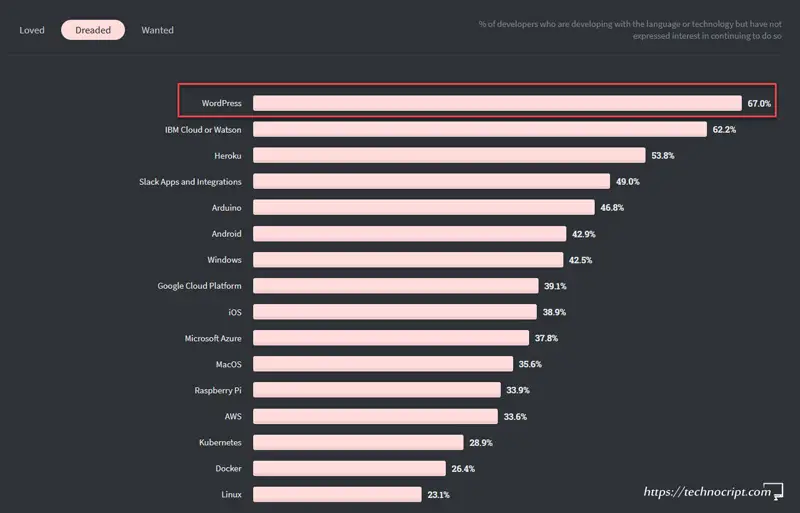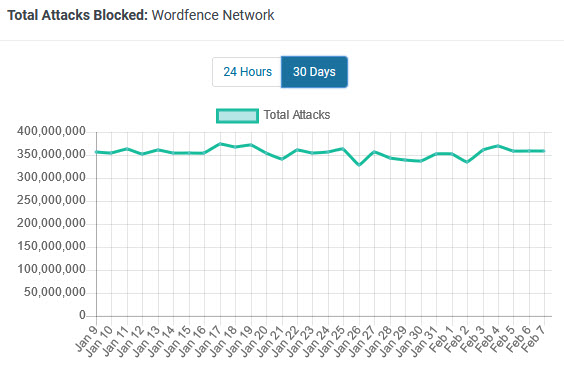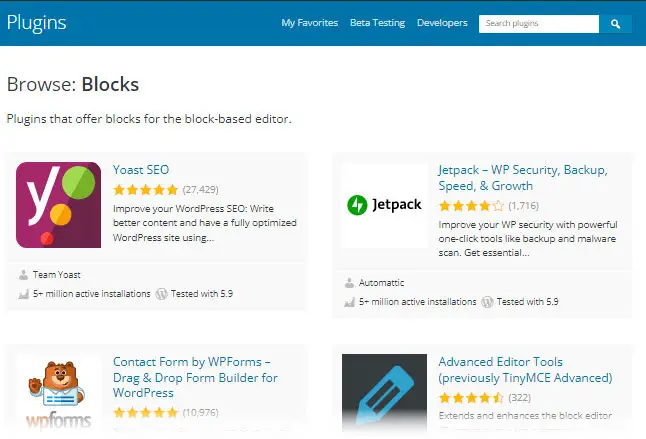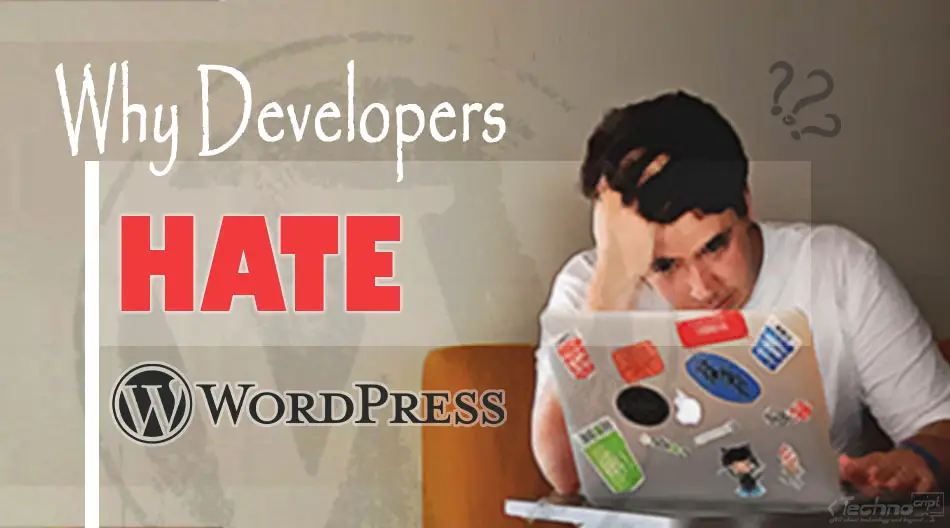Without any doubt, WordPress is one of the most powerful content management systems that dominate the web. Though, it is still a nightmare for some web developers who hate it for many reasons.
Since it was created in 2003 as a fork of b2/cafelog, WordPress has been able to accumulate a market share of over 43% of websites across the globe.

In the context of software development, there is no perfect solution, and WordPress is no exception. It has both weaknesses and strengths. If not used properly, WordPress can get complex pretty easily and might become a source of a lot of trouble.
Developers hate WordPress because they find it tangled, complex, and slow. Or they just don’t prefer its dependency on third-party plugins. Others think WordPress is prone to security issues, or simply dislike the programming language behind it.
That said, every WordPress hater deals with the platform from a different angle and based on a prior -usually bad- experience.
But someone might argue: If web developers really hated WordPress, they wouldn’t have used it to run almost half the web!
In fact, even for developers who are widely using WordPress for building great websites, the truth is that some of them do hate dealing with it in some respects.
We discuss the most common aspects that (some) experienced web developers actually hate about WordPress. Regardless of whether they are using it or not.
Developers hate WordPress because:
1. It is Written By Others
Developers hate WordPress because it is written by “OTHER” developers!
As we all know, WordPress is open-source software that has a community of developers who contribute to the project. It relies on loosely coordinated participants who collaborate to enhance the software in different ways.
Additionally, websites that run on WordPress usually rely on a mixture of plugins and themes written by other individual developers or companies.
Of course, open-source projects are great in giving the opportunity to individuals to contribute and get recognized. However, without careful moderation of the written code, there is no guarantee that these contributions will be free of low-quality or “badly” written code.
This is different from proprietary software, or so-called “closed-source software”. Where the source code is usually produced by dedicated teams and can be published only after being carefully inspected by experienced team members.
The open-source nature of WordPress might lead to poorly developed plugins and themes.
That being said, some developers hate WordPress because they may end up refactoring someone else’s code and figuring out how to implement a customized tiny feature.
For this reason, many web developers, especially experienced ones, prefer to write their own “clean” code so they retain full control over their work.
2. It is Written in PHP!
Developers hate WordPress because it’s written in PHP!
Another key reason why developers hate WordPress is not the platform itself, but the programming language behind it.
WordPress is a web-based content management system that uses a handful of programming languages and techniques. The core logic of WordPress is written in PHP.
PHP is open-source programming and scripting language that creates dynamic interactive websites. Its origins date back to 1994 as a language for web development.
In fact, many web developers don’t like PHP for different reasons, mostly due to its security concerns such as SQL injection and cross-site scripting vulnerabilities. Not to mention its legacy code that can be very painful to work with.
On top of that, some developers just find dealing with PHP quite annoying when compared to other modern languages such as C#, Java, and Python.
3. It is an Existential Threat To Developers!
Developers hate WordPress because it threatens their CAREERS!
WordPress platform primarily benefits users with no programming skills to help them build their online blogs. Typically, they just need to set up the website, choose a theme, download some plugins and start building pages using a simple text editor or an intuitive page builder.
WordPress is just a simple but powerful solution for users to learn in a very short time, and eventually start earning money from it. All this happens without getting their hands dirty in customizing the platform’s code in any way.
That being said, some web developers spend years learning how to develop systems and build software applications. Afterward, they find themselves in competition with computer hobbyists who can create simple pages in WordPress at a very low cost.
According to the Annual Developer Survey by the very famous platform Stack Overflow, WordPress has been chosen among the most 3 dreaded platforms in multiple surveys. Including 2015 (3rd place), 2016 (2nd place), 2017 (3rd place), 2019 (1st place), and 2020 (1st place).

Likewise, the development community uses the word “WordPress developer” to refer to various IT specialists, whose technical skills may not reflect the actual expertise behind this title. As a result, this raises a debate about whether WordPress developers are “real developers” or not!
In any case, WordPress doesn’t pose a threat to highly experienced developers, but it drives the prices a little bit down as an easy-to-use tool that people can opt for instead of paying for a freelance developer.
4. It is Overused!
Developers hate WordPress because they are FORCED to use it!
You can just ask any developer who hates a specific technology but still using it about the reason, and he/she will likely tell you: I am forced into it.
Similarly, the widespread popularity of WordPress as well as its powerful low-cost capabilities have motivated business owners to ask for building their websites specifically on it. Even though in many cases WordPress might not be the best solution for their requirements.
WordPress is primarily a blogging management system and website builder. It comes with all the needed tools to create web pages and manage articles. Other than that, the platform is not designed to run advanced web applications with complex requirements and a variety of features or services.
With that in mind, developers hate it because WordPress is a nightmare if they want to build a web application. It can’t replace the professional web development platforms that are more robust and require highly experienced developers to deal with, such as Laravel, Angular, and Django.
Moreover, developers hate WordPress because sometimes it is even more relevant to build a simple website using just a static or lightweight content management system against the client’s desire. Such solutions might be faster, more secure, and easier to develop.
5. It is Limited To What it Does
Developers hate WordPress because it LACKS flexibility!
WordPress platform is meant to provide tools to build, run, and manage websites, but not to develop them!
Despite the platform being open-source and its code being publicly accessible and editable by anyone, the best approach to modify it would be to create a plugin or to use a third-party one.
For this reason, developers hate WordPress because sometimes it gets frustrating to customize the platform. In many cases, developers end up looking for workarounds to implement a simple feature that is not originally supported by the platform or its add-ons.
The nature of most CMS platforms makes it difficult to extend their features or modify them.
In general, business owners assume that WordPress helps developers build a website in a short time and without much effort. This might be true to some extent! However, the lack of flexibility of WordPress widens the gap between what people expect from the developers, and what developers can actually deliver.
6. It Requires Constant Updates and Maintenance
Developers hate WordPress because it requires a lot of UPDATES!
Another issue that developers hate about WordPress is the need for continuous updates, for both the platform itself and its plugins as well.
In contrast to custom-built websites, these updates are necessary even if the website content has not changed.
Broadly speaking, regular updates are always beneficial for any system to keep it and its components up-to-date and secure. In the case of WordPress sites, such updates require extra efforts from the developers to maintain the platform even if the website content has not changed.

Furthermore, major updates might require putting the website down for some time till the updates are fully applied. This can be risky for eCommerce platforms where the downtime might lead to data inconsistency issues.
To deal with these updates, developers have to set up a testing environment or staging site to test the updates before publishing them back to the live site.
That being said, developers hate WordPress because they can’t launch and forget a WordPress site. Regular security upgrades and bug fixes as well as compatibility with PHP versions are constantly required to avoid future troubles as long as the website is up.
7. It is NOT as Cheap as it Seems
Developers hate WordPress because it seems CHEAPER than what it is!
WordPress is open-source software, it is definitely free and its code is completely open to modifications. This makes it a favorable option for many start-up businesses that don’t have enough budget to spend on a professional website.
This doesn’t mean there will be no ‘hidden’ costs.

Upon creating a website in WordPress, there will be multiple additional services to pay for, including:
- Hosting: users can create a website on WordPress for free, but they will definitely need to host it somewhere. There are many hosting services out there such as Bluehost, GoDaddy, and the official hosting service by WordPress itself. All hosting services anticipate monthly or annual fees.
- Domain: besides hosting the website files, it needs a domain name to be globally accessible by online users. Hosting services often come with a free domain name but sometimes users have to pay separately for the domain registration.
- SSL Certificate: Secure Sockets Layer (or SSL) certificates are important to have a trustworthy website and to secure interactions with its visitors. Although there are free SSL providers such as Let’s Encrypt, other paid options are also available for extra protection.
- Premium Plugins: WordPress plugins are unavoidable to enrich the website with further features. Despite most plugins coming with a free but limited plan, additional costs are to be paid to obtain extra functionalities.
- Maintenance: as we mentioned earlier, all WordPress websites require constant maintenance and updates. This leads to additional fees to cover an appropriate support plan.
- Scaling Up: as with any other web content management system, WordPress is developed to meet specific requirements. This works very well if the required business meets these requirements. Nevertheless, the business may expand in a way that goes far beyond the platform’s capabilities. Which in turn requires hiring a developer to do the changes on the website.
Accordingly, developers hate WordPress because people mistakenly think it is totally free to have any website built and running on it.
8. It is Easy To Create, Hard To Scale
Developers hate WordPress because it is not built to SCALE UP!
Unsurprisingly, it is extremely easy to create a website on WordPress, but it’s very hard to scale it.
Any WordPress expert clearly knows that the platform is powerful to run specific kinds of websites, especially those with blogs, articles, and simple eCommerce capabilities. Everything in WordPress is perfectly hooked and optimized to do this job.
The problem comes to the surface when people take WordPress far away beyond its limits. For instance, into a sophisticated web application or a fully-featured ERP system. This usually happens when the business expands so that it can’t be represented anymore in a traditional WordPress solution.
You can NOT use WordPress to build websites of the size of Amazon.com or Netflix.com!
With that in mind, developers hate WordPress because, just like any other web content management system, it can not easily expand to create advanced web applications.
9. It is Painfully Slow, Sometimes!
Developers hate WordPress because of its SLOW performance!
Another thing that developers might criticize about WordPress is the performance of its websites when compared to a static website or a lightweight CMS platform.
The structure of WordPress websites is composed of articles (pages), widgets (blocks), shortcodes, menus, sidebars, breadcrumbs, and so on. This means that on every page visit, the whole page with all these elements needs to be loaded. This makes the website performance suffers.
This approach of page loading is considered outdated in comparison to other modern JavaScript techniques that load only parts of the requested page or element.
Additionally, although plugins are essential parts of most WordPress sites, additional plugins will negatively impact the website’s performance. Especially if the website was overloaded with poorly developed plugins that follow bad design decisions.
10. It has Poor OOP Architecture
Developers hate WordPress because everything is FUNCTIONS!
Developers also hate WordPress because of the technical limitations they might face when dealing with its function-based architecture.
The code of WordPress follows the pattern of global variables and independent functions wrapped within classes. WordPress source code is usually a mix of PHP scripts, HTML tags, as well as global functions and variables. Most times, professional developers would rather prefer to deal with an Object-Oriented structure.
OOP (Object-oriented programming) is a development approach that follows the concept of “objects” (or classes) instead of “functions” (or procedures).
Thus, to modify the core logic, developers usually need to either find an action hook or override a core function. This makes it more difficult for developers who are more willing to build their own functions and structure.
11. It is Popular For Hackers
Developers hate WordPress because it’s prone to SECURITY threats!
The popularity of WordPress as well as its publicly accessible code make it a very popular target for common security vulnerabilities and attacks. Like unauthorized logins, Cross-Site Scripting (XSS), Brute Force, and DDoS attacks.
Generally, hacking the WordPress platform itself is not easy as the WordPress community is doing a great job releasing security updates. Yet, the poorly designed and not constantly maintained plugins make any WordPress-based site insecure and vulnerable to popular hacking attacks.

For these reasons, developers hate WordPress because it requires extra work to keep the website secure and run additional prevention measures. These might include:
- Install core security updates immediately upon release.
- Install regular and maintenance updates.
- Choose trustworthy and well-maintained plugins and themes, and keep them all updated.
- Apply techniques to hide the login page.
- Force using HTTPS connections on all pages.
- Apply 2-Factor authentication techniques.
- Run security plugins such as Wordfence and iThemes Security.
12. It is Heavily Dependent on Plugins
Developers hate WordPress because it’s heavily dependent on third-party THEMES and PLUGINS!
WordPress is well suited to perform specific functions. The platform itself comes with tons of built-in features that are fundamental for website building and blog management. Any extra feature can be provided by external plugins/themes.

Despite having a huge marketplace for additional plugins and themes, many of them are poorly written and might result in declining performance or security vulnerabilities.
The more plugins you add to WordPress, the more likely you will run into issues.
As WordPress plugins are developed by individual parties, they might be incompatible with each other. A simple conflict between installed plugins might cause unexpected serious issues to the website and its functionalities.
Accordingly, developers hate WordPress because, for every single additional feature, they need to carefully look for a high-quality plugin that fits the user’s needs. They also need to keep watching the installed plugins (and themes) and find a replacement in case any of them becomes no longer maintained.
13. It Breaks Very Easily!
And Finally, Developers hate WordPress because it CAN BREAK VERY EASILY!
The constant updates of WordPress besides its dependency on separately developed add-ons, make it prone to unexpected and sudden breaks in many ways.
For example, if automatic updates are enabled on the website (or on its plugins/themes), one single update might kill the whole site or parts of it.

This also means on every single update the developer needs to check for breaking changes and conflicts throughout the whole website.
Furthermore, in case of breaks, it gets complex to detect the issue, understand its reasons, and fix it properly. In most cases, WordPress developers end up activating/deactivating each plugin to find out the root of the issue to fix it.
The majority of hosting services come with backup plans to help users restore their broken sites after updates. To avoid such hassles, WordPress developers are always recommended to test any updates on a staging site.

